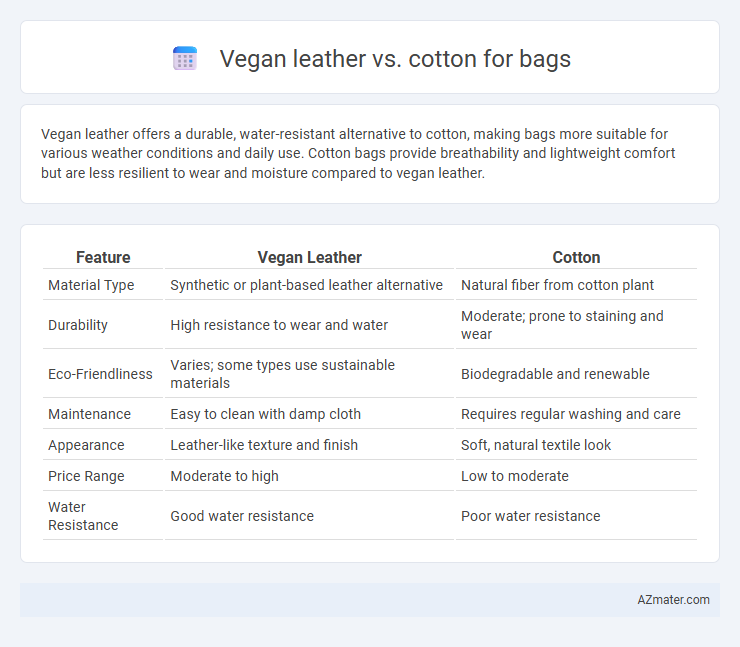Vegan leather offers a durable, water-resistant alternative to cotton, making bags more suitable for various weather conditions and daily use. Cotton bags provide breathability and lightweight comfort but are less resilient to wear and moisture compared to vegan leather.
Table of Comparison
| Feature | Vegan Leather | Cotton |
|---|---|---|
| Material Type | Synthetic or plant-based leather alternative | Natural fiber from cotton plant |
| Durability | High resistance to wear and water | Moderate; prone to staining and wear |
| Eco-Friendliness | Varies; some types use sustainable materials | Biodegradable and renewable |
| Maintenance | Easy to clean with damp cloth | Requires regular washing and care |
| Appearance | Leather-like texture and finish | Soft, natural textile look |
| Price Range | Moderate to high | Low to moderate |
| Water Resistance | Good water resistance | Poor water resistance |
Introduction to Vegan Leather and Cotton Bags
Vegan leather, crafted from synthetic materials such as polyurethane or innovative plant-based alternatives like pineapple leaves and mushroom fibers, offers a cruelty-free and water-resistant option for bags. Cotton bags, made from natural fibers, provide breathability, biodegradability, and lightweight durability, making them a sustainable choice favored for casual and everyday use. Both materials cater to eco-conscious consumers but differ significantly in texture, maintenance needs, and environmental impact during production.
Material Sources and Sustainability
Vegan leather is crafted from synthetic or plant-based materials such as polyurethane, pineapple leaves, or cork, offering a cruelty-free alternative to animal leather but often involves energy-intensive production with potential microplastic pollution. Cotton, especially organic cotton, is derived from natural fibers with a renewable source and biodegradable quality, though conventional cotton farming requires significant water, pesticide use, and land resources. Evaluating sustainability, organic cotton generally has a lower environmental footprint compared to synthetic vegan leather, which depends on the specific manufacturing processes and raw material origins.
Environmental Impact Comparison
Vegan leather, often made from polyurethane or plant-based materials like pineapple leaves or apple peels, generally has a lower water footprint and reduced pesticide use compared to cotton, which demands significant water and chemical inputs for cultivation. Cotton production contributes to soil degradation and high greenhouse gas emissions due to intensive farming practices, while some vegan leathers utilize upcycled waste, reducing landfill impact. However, synthetic vegan leather's reliance on fossil fuels and potential microplastic pollution challenges its sustainability, making plant-based and recycled variants more environmentally favorable than traditional cotton bags.
Durability and Longevity
Vegan leather offers superior durability compared to cotton, resisting water, stains, and scratches more effectively, making it ideal for everyday use. Cotton bags tend to wear out faster due to fabric fraying and susceptibility to moisture damage. Over time, vegan leather maintains its shape and appearance longer, ensuring greater longevity in bag materials.
Aesthetics and Design Versatility
Vegan leather offers a sleek, modern aesthetic with a smooth finish that mimics genuine leather, making it ideal for chic, structured bag designs. Cotton provides natural texture and breathability, lending itself to casual, bohemian-inspired styles with customizable prints and patterns. Design versatility in vegan leather allows for a variety of colors and embossing, while cotton excels in lightweight, flexible forms with eco-friendly appeal.
Comfort and User Experience
Vegan leather offers a smooth, water-resistant surface that enhances durability and ease of maintenance, contributing to a sleek and comfortable feel when carrying a bag. Cotton provides breathability and softness, allowing for better air circulation and reducing skin irritation, which benefits users in warmer climates or extended use. The choice between vegan leather and cotton for bags ultimately affects comfort through material texture, temperature regulation, and overall tactile experience.
Maintenance and Cleaning
Vegan leather bags require gentle cleaning with a damp cloth and mild soap to maintain their smooth surface and prevent cracking, while avoiding harsh chemicals that can damage the material. Cotton bags are machine washable and more resistant to stains, but frequent washing may cause fading or fabric wear over time. Both materials benefit from air drying in a shaded area to preserve color and texture during maintenance.
Cost and Market Availability
Vegan leather bags typically cost more than cotton bags due to synthetic materials and production processes, yet their growing popularity has expanded market availability across fashion retailers. Cotton bags remain widely accessible and affordable, benefiting from established supply chains and sustainable branding. Consumer demand for cruelty-free products fuels vegan leather market growth despite higher prices.
Ethical Considerations
Vegan leather offers a cruelty-free alternative to traditional leather, avoiding animal exploitation and reducing the carbon footprint compared to animal farming, though it sometimes relies on synthetic materials derived from fossil fuels. Cotton bags provide a biodegradable and renewable resource option, but conventional cotton farming can involve significant pesticide use, water consumption, and labor concerns. Choosing organic cotton or plant-based vegan leather enhances ethical sustainability by minimizing environmental impact and promoting fair labor practices.
Which is Better for Bags: Vegan Leather or Cotton?
Vegan leather offers superior durability, water resistance, and a sleek aesthetic ideal for long-lasting, stylish bags, while cotton provides breathability, lightweight comfort, and natural biodegradability suited for casual, eco-friendly totes. Vegan leather resists stains and retains shape better, making it preferred for structured and designer bags, whereas cotton bags are easier to wash and maintain but may wear out faster and absorb moisture. Choosing between vegan leather and cotton depends on the desired bag function, durability needs, environmental impact, and style preferences.

Infographic: Vegan leather vs Cotton for Bag
 azmater.com
azmater.com